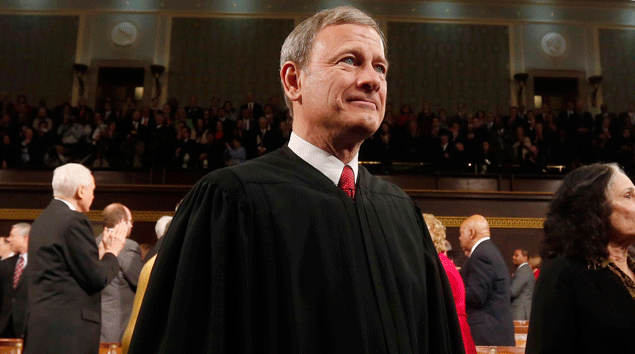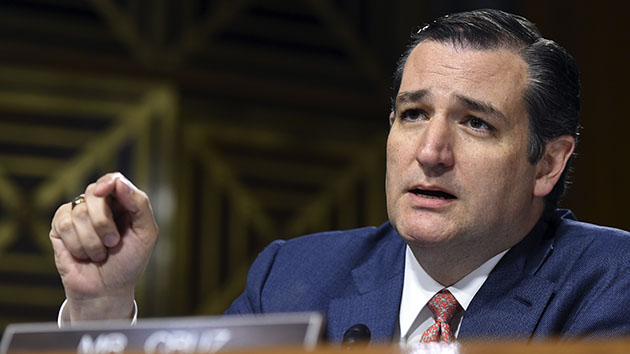
Chief Justice John RobertsLarry Downing/AP
Chief Justice John Roberts kicks off his 11th year on the US Supreme Court on Monday, not with accolades for his stewardship of the nation’s highest court, but as the target of GOP presidential candidates who think he’s gone soft for siding with liberals on the big Obamacare decision. But Roberts will have a good chance to redeem himself with his conservative base in the coming term.
Unlike last year, the October 2015 Supreme Court term that starts this week isn’t full of blockbuster cases. There are no abortion or religious freedom cases on the docket yet, although there are some waiting in the wings that will probably make it to the court before the end of the year. In the meantime, several cases driven solely by deep-pocketed conservative legal outfits will provide Roberts with opportunities to reassert his conservative bona fides by potentially slapping down racial preferences in college admissions, weakening union membership, or further undermine voting rights for minorities. He’ll also have a bevy of opportunities to continue his assault on workers’ and consumers’ ability to check corporate misconduct through class actions.
Not everything facing the Roberts’ court this term is political, though. The docket is heavily loaded with criminal justice cases, where ideological differences on the court are less likely to dictate the outcomes—after all, liberal justice Sonia Sotomayor is a former prosecutor. The death penalty makes another strong appearance this term, though not quite as dramatically as this past spring, when the Supreme Court rejected a challenge to lethal injection.
Here are five cases to watch:
Fisher v University of Texas at Austin: Fisher is one of two cases the court is hearing this term, orchestrated by Edward Blum, the failed Republican congressional candidate from Texas who, with funding from a secretive conservative foundation, has helped eviscerate the Voting Rights Act at the Supreme Court. It marks the second time Abigail Fisher has come before the Supreme Court to challenge her inability to gain admission to the University of Texas in 2008. Fisher, long graduated from Louisiana State, claims the University of Texas discriminated against her because she is white. She’s challenging the university’s use of racial preferences for a tiny sliver of its incoming freshman class. Evidence shows that her grades and test scores wouldn’t have gotten her admitted even if she were black under the school’s “holistic” admissions process.
In 2013, the court voted 7 to 1 (with Justice Elena Kagan recusing and Justice Ruth Bader Ginsberg dissenting) in favor of Fisher, and sent the case back to the 5th Circuit Court of Appeals to take a closer look at the facts of the case. It did, and once again sided with the university. Consequently, the court is hearing Fisher’s case again, even though the only possible thing Fisher can win at this point is her $100 admission fee; even a decision in her favor isn’t likely to completely do away with affirmative action in college admissions. In fact, the case is so weak that the Yale Law Review published an article in 2012 titled “How (Not) to Bring an Affirmative Action Challenge.” Fisher’s lawyers, and their backers, are clearly lining up better lawsuits to challenge racial preferences in university admissions at the University of North Carolina and Harvard, but they haven’t yet given up Fisher, possibly because a favorable ruling from Roberts and the conservatives could pave the way for those other cases to deal the death blow to the practice.
Evenwel v Abbott: Rick Hasen, an election law professor at the University of California, has called this case an “attempted GOP power grab in Texas and other jurisdictions with large Latino populations.” Evenwel, another Blum-backed case, is challenging the principal of “one person, one vote,” in the way Texas legislative districts are drawn. The plaintiffs in the case are two Texas residents who claim there are too many voters in their state Senate districts. As a result, they argue, each individual vote becomes less significant than those of residents whose districts have the same population but fewer eligible voters. They are challenging Texas’ redistricting policy and want the court to order the state to redraw districts based on the number of voters, as opposed to overall population, which is the standard it uses now.
Such a change would effectively diminish the political clout of urban areas, which have large populations of people who can’t vote, such as felons and noncitizens. Traditionally the court has left this sort of redistricting decision to the states. But the plaintiffs now want the court to impose a uniform national standard, based on voter numbers as opposed to overall population—an argument that may not appeal to the court’s diehard states-righters, Justices Antonin Scalia and Clarence Thomas. That said, Blum tried to get the court to take a similar case back in 2001, and while the majority rejected the petition, Thomas wrote a dissent arguing that the issue ought to be considered. Where Roberts might fall on this one is anyone’s guess, but if he sticks to the promise he made during his confirmation hearings to serve as something of an umpire calling balls and strikes rather than a judicial activist, he’s likely to rule against Blum and his plaintiffs, if only because the vast majority of lower courts have refused to force states to choose one redistricting method.
Friedrichs v California Teachers Association: Dubbed the “Citizens United” of union cases, this lawsuit is ostensibly a free speech challenge, as was Citizens United. Justice Samuel Alito teed up Friedrichs in two earlier decisions, Harris v Quinn (2014) and Knox v Service Employees International Union (2012), in which he virtually invited union busters to bring new challenges to laws that require public employees to pay union dues. Roberts, who’s known for his long-game approach to blowing up established precedent, voted in the majority with Alito in both cases. At issue in Friedrichs is a California law requiring public school teachers to pay dues to a local teachers’ union to underwrite the cost of the union’s work on collective bargaining. Teachers who don’t want to subsidize the union’s other political activity have to “opt out” in writing every year to avoid those charges, though they still have to pay for their share of the representation.
A handful of California teachers who aren’t union members—represented by Michael Carvin, who brought last term’s failed anti-Obamacare lawsuit—are challenging both of these provisions as infringements on their free speech. The unions argue that such a mandate avoids a “free rider” problem of people benefiting from union activity without paying for it, but the plaintiffs say free riders aren’t a good enough reason to compromise employees’ right to choose not to subsidize political activity with which they might disagree. Given the conservative majority’s history in laying the groundwork for this case, the unions may lose.
Foster v Chatman: Death row inmate Timothy Foster has been arguing for years that prosecutors in Butts County, Georgia, illegally kicked all the black people off the jury in his capital trial, in violation of the Supreme Court’s 1986 ruling in Batson v Kentucky. In theory, Batson was supposed to ban racial discrimination in jury selection, but as veteran Supreme Court litigator Paul Smith recently said at a National Review-sponsored Supreme Court briefing, “That rule has been violated more than it’s been followed.” Prosecutors simply became adept at finding allegedly race-neutral excuses for eliminating black jurors from trials, and judges have accepted them.
That’s initially what happened in Foster’s case. But in 2006, his lawyers obtained some of the prosecutors’ jury selection notes through an open records request, and they hit the jackpot. Prosecutors had insisted that their preemptory challenges to black jurors were not based on race, but instead on neutral things such as age and profession, or more nebulous but legal things such as “failure to make eye contact.” District attorney Stephen Lanier at one point tried to explain his actions in court by saying he was actually trying to weed out women, not blacks, because they tend to have “serious reservations” against the death penalty. The notes show otherwise. Prosecutors had highlighted the race of the black jurors on several different lists, and in one case even listed the only five black jurors in the pool under the heading “Definite NOs.”
In the past, Roberts has essentially required anyone making a racial discrimination claim to present evidence of overt racism of the sort that rarely surfaces in these days of political correctness. His ability to overlook structural racism is keen. But he’ll have a hard time ignoring the facts in this case, or the host of former federal and state prosecutors, including the best-selling legal-thriller author Scott Turow, who have filed an amicus brief in the case urging the court to rule in Foster’s favor. Roberts has shown a desire to find more unanimity in the court’s rulings. This case could end up being one of those—or not. His decisions on the use of race in jury selection have been all over the map, making him a bit of a wild card on this one.
Montgomery v Louisiana: Henry Montgomery, who is serving life in prison, is asking the court to retroactively apply its 2012 decision in Miller v Alabama, which prohibited mandatory life sentences for juveniles. Montgomery is an unusual plaintiff. He was a 17-year-old African American kid when he shot and killed a white sheriff’s deputy. But that crime took place in 1963 in Baton Rouge Parish, against the backdrop of Ku Klux Klan cross burnings and long before there were laws requiring juveniles to have lawyers. Montgomery is now 69 years old, having survived more than 50 years in the infamous Angola prison, known in the 1960s as the bloodiest prison in the South because of the number of inmate assaults. He’s asking to be resentenced based on the Miller decision. His victim’s daughter has asked the court to rule against him, but Montgomery’s case has won the support of other victims of juvenile murderers who think teenagers ought to have the chance for redemption. Roberts wrote a blistering dissent in Miller, arguing that the court has never found a mandatory life without parole sentence to be cruel and unusual punishment; as a result, he didn’t believe juveniles should get an exemption. So he’s not likely to decide that Miller ought to now be applied retroactively. But he may get overruled on this one. Conservative Justice Anthony Kennedy voted with the liberals in Miller to secure the 5-4 majority in favor of getting rid of the harsh sentences, and he seems likely to join them again in Montgomery.









